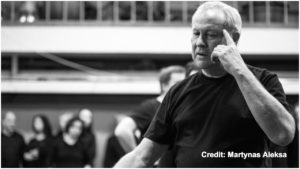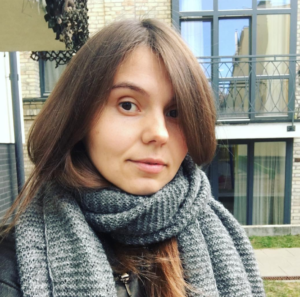
Interview: Director Robert Wilson on His ’Turandot,’ Lady Gaga, & His Style
By Polina LyapustinaFew directors in the opera world are quite as iconic as Robert Wilson. While his style, with its cool color palettes and calculated and slow movements that look like pantomime, may not be for everyone, there is no denying that he has a clear vision for how he sees theater.
He’s worked a nearly any major theater organization you can imagine and at 77, he’s still going strong.
This weekend, Wilson is premiering his production of Puccini’s “Turandot” at Lithuanian Nation Opera. This production by the famed auteur came from the Teatro Real de Madrid and then will move to the third co-creator theater in Toronto. Prior to the opening night, the director met with the audience and also answered a few questions from OperaWire.
A Date with Lady Gaga
Robert Wilson isn’t one to answer questions directly, but it’s just because he has much more to say and to give. At the beginning of the event, a moderator asked him to compare his approaches to his “Turandot” and another Puccini’s work “Madama Butterfly.” He kept silence for two minutes and gave a short historical note about the “Turandot” legend transforming to the opera in centuries.
But then he made a major left turn.
“This morning I watched Lady Gaga on TV. She won the Oscar. She was great, you know,” he surprisingly noted. He told the story about how she called at his office seven years ago to make “a date.” Two weeks after this “date”, she called him and asked to tell her about the theatre.
“You know, Gaga, in the theatre the last second is the most important, and next is the first second. Sometimes, if you set the last second right, they will forgive you for everything you’ve done all night.”
This is a rule that he sticks with to this day.
“In making ‘Turandot,’ I was always tried to figure what is that last second. And then, where we began. And then, how would you draw a line from the first to the end.”
With this line, Wilson shows an amazingly practical designer’s approach to his opera productions.
“Theatre is about one thing. And if it’s not about one thing — it’s too complicated.”
And it’s his life’s work to find this “thing.”
“It can be anything, but once you know it you can develop it in a very complex way. Complex, but not complicated.”
So what is this in the context of his “Turandot?”
“When we see Turandot for the first time, she’s up in the air, very high, alone. In the end, she stands near the audience and the entire company and Calaf are standing behind, in a distance. So she keeps standing alone.”
And what of that kiss, when she presumably stops “standing alone?”
“I saw her kissing this stupid guy and… I did something dramaturgicallym [I] immediately took her back. So she remained vengeful, powerful, and greedy.”
For Stillness’ Sake
So how does Robert Wilson find his iconic style?
It all starts with creating an alternative universe. And the “Turandot” story fits perfectly. It’s a fairytale, so don’t expect Bob Wilson to make it real. Everything should be just opposite to reality: space, light, movement.
“A stage is unlike any other space. I hate naturalism. To be on stage is something artificial. And if you try to act naturally it seems artificial. But if you accepted it as something artificial, it becomes more natural.”
With this in mind, Wilson’s first major step is to show actors how to stand on stage. For the famed director, this is the most important skill, but it also seems to be the most difficult. In fact, per Wilson no one teaches singers how to stand on a stage in the Western theatres.
“Every singer, every actor has to stay on a stage. And you should learn to stand by standing. Then learn to walk by walking. This work is formal. And how you stand is essential. It deals with movement and stillness.”
He quoted Ezra Pound in this regard: “The fourth dimension is stillness. And the power over wild beasts”.
So working with these basic skills, the director found his freedom and then concentrated on the main operatic medium — a sound.
“If I go to the opera, I really want to hear the music. I close my eyes. So the challenge is to find how can I keep my eyes open? How what I see can help me to hear music better?”
Keeping His Style
How does he share his approach with the musical directors? In his life, he worked directly with composers in the pit, as well as with other interpreters — conductors. But for this question, the difference is just in personalities, not in their status. Another thing is the source.
“Puccini wrote ‘Turandot,’ I can’t rewrite it, as well as I can’t rewrite Shakespeare or Wagner. So you have to pay respect to the Master, but yet to be careful not to be a slave. You have to find your own way.”
Wilson paves his way by balancing the production around the source. “If the conductor wants to up the tempi, then I can slow down what’s on stage. There’s a tension between what I’m hearing and what I’m seeing.”
And all of these are just frames to get you somewhere else. It starts with something very simple as a single movement. And Wilson wants it to be as simple as possible, even mechanical. Because if you do it mechanically then you have freedom for your interpretation. And this is the reason for real beauty on stage.
“Why does only one dancer seem so beautiful when they all do the same steps. But it’s important how they feel in this form. And that is the frame. Once learned, it gives freedom. It is a lot of work: to learn and to be free.”
Did he become mechanical in this way with his own style? His formula seems to be the same for every source, but results are always different. Some critics said it’s not enough and called “Turandot” performance in Madrid “opera in concert.” He thinks it’s fine. His style is key, and he just tries to make every his opera project beautiful.
Wilson’s sensibility is totally different and the audience should count it to their expectations.
“I’m from Texas and the landscape of Texas in all my works”.
It is just in his nature. He needs space. And he needs to give space to others. And to music. And that’s why he does operas. To give space and freedom to the music.



